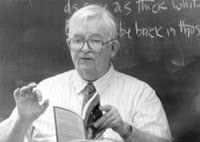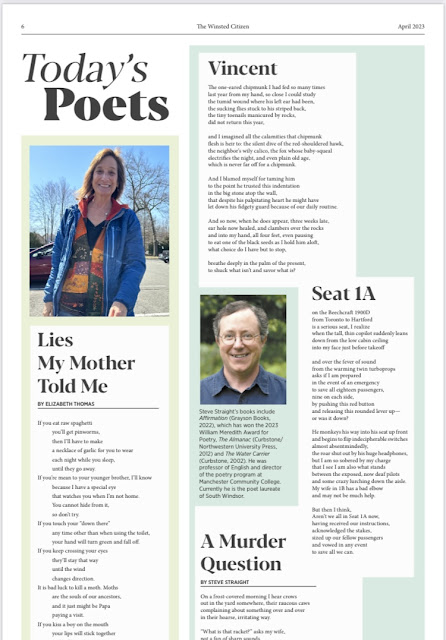The Cool Justice Report
The Cool Justice Report exposes wrongdoing in the politically-charged worlds of cops and courts. It runs compelling stories of general interest and boxing, literary and political items, as well as selected poems and pieces of fiction. email: tntcomm82@cs.com -- Twitter@cooljustice -- A 2nd collection of columns, 'more COOL JUSTICE,' http://morecooljustice.com/ followed 'Law & Justice in Everyday Life.'
Saturday, May 24, 2025
Tuesday, May 23, 2023
ICYMI: Post Via The Winsted Citizen Blog: A Word From El Bardo The Legend
THE ASSASSIN
By LEO CONNELLAN

By LEO CONNELLAN

I am hidden within
who you think I am
--
We Treat Poets, Writers, Authors Right:
The Winsted Citizen
https://winstedcitizen.org/
Our Today’s Poets page is inspired by the late Poet Laureate of Connecticut Leo Connellan aka El Bardo The Legend, who published a column under that banner with The Register Citizen of Torrington 1994-95.
Connellan modeled his offering after that of Marcia Lee Masters, poetry editor of The Chicago Tribune. She was the daughter of "Spoon River Anthology" author Edgar Lee Masters, the trailblazing Midwesterner who also shared a law office with Clarence Darrow. "Let's run a poetry column like Marcia Lee Masters," Connellan said. "We'll get lots of readers."
Connellan compiled original works by acclaimed poets and new voices from throughout the nation. The big hitters included New York Quarterly Editor William Packard, Bollingen Prize winner Fred Chappell, Negative Capability Editor Sue Walker and Fulbright Scholars David B. Axelrod and Diana Der-Hovanessian, as well as Connecticut's own Marilyn Nelson, Franz Douskey, Vivian Shipley and Richard Telford. Promising college and high school students also saw their works published by Connellan.
The Today’s Poets page in The Winsted Citizen has published works by Franz Douskey, Kate Rushin, Jon Andersen, Samuel John Hazo, Ravi ‘I Don’t Play the Sitar’ Shankar, Elizabeth Thomas, Steve Straight, Victoria Nordlund and Sandra Bishop Ebner. The June edition will feature poems by Julia Paul and John Stanizzi. Also, please check out our advertisements featuring authors.

ENOY READ SUBSCRIBE ADVERTISE DONATE
who you think I am
--
We Treat Poets, Writers, Authors Right:
The Winsted Citizen
https://winstedcitizen.org/
Our Today’s Poets page is inspired by the late Poet Laureate of Connecticut Leo Connellan aka El Bardo The Legend, who published a column under that banner with The Register Citizen of Torrington 1994-95.
Connellan modeled his offering after that of Marcia Lee Masters, poetry editor of The Chicago Tribune. She was the daughter of "Spoon River Anthology" author Edgar Lee Masters, the trailblazing Midwesterner who also shared a law office with Clarence Darrow. "Let's run a poetry column like Marcia Lee Masters," Connellan said. "We'll get lots of readers."
Connellan compiled original works by acclaimed poets and new voices from throughout the nation. The big hitters included New York Quarterly Editor William Packard, Bollingen Prize winner Fred Chappell, Negative Capability Editor Sue Walker and Fulbright Scholars David B. Axelrod and Diana Der-Hovanessian, as well as Connecticut's own Marilyn Nelson, Franz Douskey, Vivian Shipley and Richard Telford. Promising college and high school students also saw their works published by Connellan.
The Today’s Poets page in The Winsted Citizen has published works by Franz Douskey, Kate Rushin, Jon Andersen, Samuel John Hazo, Ravi ‘I Don’t Play the Sitar’ Shankar, Elizabeth Thomas, Steve Straight, Victoria Nordlund and Sandra Bishop Ebner. The June edition will feature poems by Julia Paul and John Stanizzi. Also, please check out our advertisements featuring authors.

ENOY READ SUBSCRIBE ADVERTISE DONATE
Monday, May 22, 2023
ICYMI: Post Via The Winsted Citizen Blog: June Edition in Production / Staff Updates / We're going digital in addition to print ... Stay tuned ...
If it's important to you, it's important to us

Only those who attempt the absurd
will achieve the impossible
~ M. C. Escher
A Note From The Editor & Publisher
Dear Readers, Advertisers, Donors,
Thanks to you, we not only still exist, we are flourishing.
Our June edition – the fifth – is in production and will hit the mail and the street June 2.
As with many startups, a major constant is change. You are seeing new reporters and photographers in each edition.

Our Executive Editor Melanie Ollett has been leading the charge in recent editions, with strong support from Contributing Editor Michelle Manafy. Many readers know Melanie works as a librarian and is looking forward to enjoying the summer with her children; that is precisely what she will be doing as of July 1 while continuing to serve the paper on a limited basis as a contributing editor.

Succeeding Melanie as executive editor in July will be Doug Clement, former senior editor at Connecticut Magazine and longtime editor of The Litchfield County Times. Few people know the region and its people, especially the arts and culture scene, better than Doug.
Doug will be leading the charge into the fall and next year: Litchfield County & Beyond ...
Yes, we plan to be around for a while. You might begin to think of us as Connecticut’s premiere newsmagazine. That’s part of our vision for 2024.
We continue striving to earn your trust. Please continue to let us know how we’re doing and what you want to see in our publication. Remember: It’s Your Paper, We Work For You.
Andy Thibault, Editor & Publisher, May 12, 2023
tntcomm82@cs.com
860-690-0211
WHERE TO GET THE PAPER ON THE STREET https://winstedcitizen.org/where-to-find-the-winsted-citizen/
FOOTNOTE: We're going digital in addition to print. Stay tuned ...
ENOY READ SUBSCRIBE ADVERTISE DONATE
Sunday, April 02, 2023
Las Vegas Publisher Acquires Rights To Louis The Coin Memoir Update
Pub Date: Sometime in 2024
-
The Whole Idea Behind It
Was To Be Like A Tax Collector
Louis the Coin was a genius in metallurgy whose estimated haul from producing counterfeit slot tokens and chips easily exceeded $3 to $4 Million from casinos around the country. Some casinos admitted it, and many, most of which were in Nevada didn't.
He sat at the right hand of New England Mob Boss Raymond Patriarca – one of the most powerful gangsters in U.S. history – with direct access to his family members. Louis was a friend of theirs and talent, not a made man.
Louis was neither your average jeweler nor your average mob associate. He began his criminal career as a teenager and went on to earn a business degree from Providence College. In the years before his death, Louis attended community college in Rhode Island because he loved learning.
His expertise ranged from making jewelry and fixing printing presses to orthotics and of course, counterfeiting slot machine tokens and currency.
Colavecchio could duplicate or create almost anything made out of precious metals or stones. All he needed was a sample. The samples were analyzed professionally for content, weight and availability.
Foxwoods had been booming for about five years when Colavecchio set his sights on Connecticut; Mohegan Sun had just opened.
Colavecchio never talked about his friends – at least to police. But one of the important numbers in his personal phone directory was for Louis “Baby Shacks” Manocchio, then the reputed Mafia boss of Rhode Island. Manocchio lived in Providence’s Federal Hill neighborhood, where he once operated the Café Verdi restaurant. He was convicted of a mob hit in 1968, but that was overturned by the Rhode Island Supreme Court. In 2015 Manocchio was released from federal prison to a halfway house after serving five years for his role in an extortion plot.
Before Colavecchio could move on the casinos, he needed to do some homework. He also needed some serious equipment. Colavecchio's expert analysis revealed he needed the following: precious metals including copper, zinc and nickel; a 150-ton press from Italy; and laser-cutting tools to cut, shape and create dies to stamp out the coins. The coins were tokens, to be used in Las Vegas, Loughlin, Atlantic City and the Tribal Casinos in Connecticut.
When state police brought a sample of Colavecchio’s product to Foxwoods, the experts did not believe it was counterfeit. Some called it a masterpiece. State police advised the casino to keep track of inventory; the token counts were bound to be off because of the surplus. Meanwhile, the inventories at Atlantic City casinos were multiplying like rabbits.
“We know that he hit Vegas hard,” an investigator said. “But since many of the directors of security there were former FBI agents, they denied it. The problem did not exist. It never happened.”
Evidence mounted. A surveillance team comprised of detectives from Las Vegas, New Jersey and Connecticut waited for Colavecchio to hit New Jersey or Connecticut again. He chose New Jersey. This time he used only $100 tokens. It was easy. There were fewer machines to watch.
Colavecchio was arrested in Atlantic City in late December 1996. The pinch did not make the papers for about a week. In his car, Colavecchio had 750 pounds of counterfeit tokens, a fake police ID, disguises, a handgun, maps of casinos and various casino documents.
The FBI, Secret Service, three state police agencies and Providence police took inventory at Colavecchio’s Providence operation. The government had to rent two storage facilities to store all the loot that was seized.
Everyone took their turn arresting Colavecchio. He hired a former Rhode Island attorney general and a respected New London attorney as his lawyers.
Foxwoods and Mohegan Sun acknowledged finding a total of at least $50,000 in fake tokens. Investigators borrowed microscopes from local high schools to inspect mounds of tokens. It took them weeks just to determine that Colavecchio hit one Mohegan Sun jackpot for $2,000.
Worked out by Connecticut based detectives, Secret Service and prosecutors, Colavecchio ended up in a conference room and getting VIP treatment at Mohegan Sun. His lawyers had worked out a deal. Colavecchio showed law enforcement how he did the job, and promised to help the casino tribes and the state ward off any future raids. They say he was a hero in Providence as well. Colavecchio served a relatively short federal sentence at Fort Dix in New Jersey and did not “rat out” any of his friends.
The New York Times and Providence Journal also reported Louis was hired by the U.S. Mint upon his release from federal prison for the token scheme a couple decades ago. That was because his dies in coins were of better quality than government production. The U.S. government paid Louis about $18,000 as a consultant.
Louis died on July 6, 2020 at his daughter’s home in Cranston, RI. He had gained a compassionate release from federal prison weeks earlier after serving time for counterfeiting $100 bills. He was 78, as noted in his New York Times obituary.
https://www.nytimes.com/2020/07/13/us/louis-colavecchio-dead.html?searchResultPosition=1
The Connecticut State Police Museum, in cooperation with The Mob Museum in Las Vegas, is developing a Louis the Coin exhibit.
He counted among his friends the detective who arrested him in Connecticut.
The Connecticut State Police Museum, in cooperation with The Mob Museum in Las Vegas, is developing a Louis the Coin exhibit.
DID LOUIS REALLY ... ???
Louis The Coin, The Poem
POEM TEXT
This video was filmed
at the CT State Police Museum
-
Theme Song,
King Louis de la Provvidenza
Performed by Rick Reyes, Asher Delerme
Subscribe to:
Comments (Atom)

